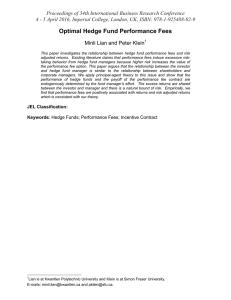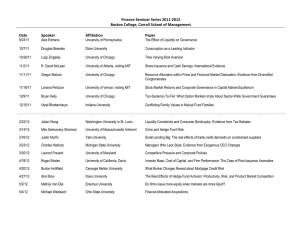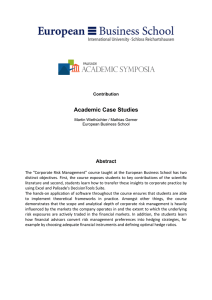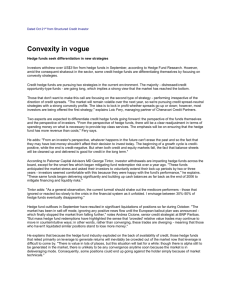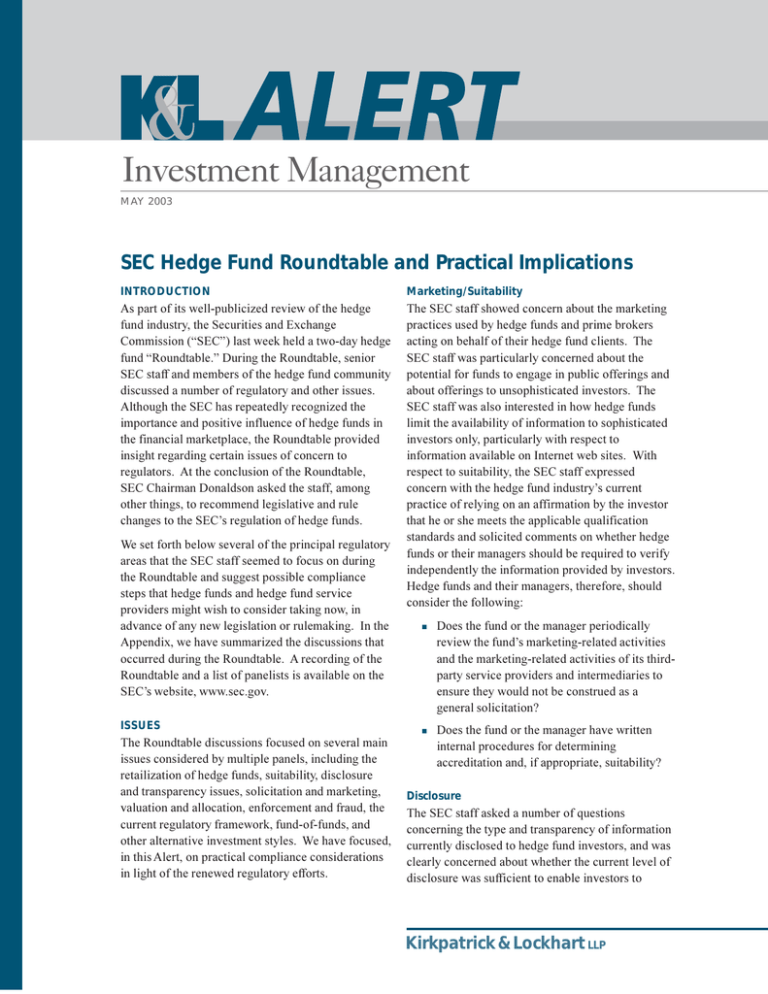
Investment Management
MAY 2003
SEC Hedge Fund Roundtable and Practical Implications
INTRODUCTION
Marketing/Suitability
As part of its well-publicized review of the hedge
fund industry, the Securities and Exchange
Commission (SEC) last week held a two-day hedge
fund Roundtable. During the Roundtable, senior
SEC staff and members of the hedge fund community
discussed a number of regulatory and other issues.
Although the SEC has repeatedly recognized the
importance and positive influence of hedge funds in
the financial marketplace, the Roundtable provided
insight regarding certain issues of concern to
regulators. At the conclusion of the Roundtable,
SEC Chairman Donaldson asked the staff, among
other things, to recommend legislative and rule
changes to the SECs regulation of hedge funds.
The SEC staff showed concern about the marketing
practices used by hedge funds and prime brokers
acting on behalf of their hedge fund clients. The
SEC staff was particularly concerned about the
potential for funds to engage in public offerings and
about offerings to unsophisticated investors. The
SEC staff was also interested in how hedge funds
limit the availability of information to sophisticated
investors only, particularly with respect to
information available on Internet web sites. With
respect to suitability, the SEC staff expressed
concern with the hedge fund industrys current
practice of relying on an affirmation by the investor
that he or she meets the applicable qualification
standards and solicited comments on whether hedge
funds or their managers should be required to verify
independently the information provided by investors.
Hedge funds and their managers, therefore, should
consider the following:
We set forth below several of the principal regulatory
areas that the SEC staff seemed to focus on during
the Roundtable and suggest possible compliance
steps that hedge funds and hedge fund service
providers might wish to consider taking now, in
advance of any new legislation or rulemaking. In the
Appendix, we have summarized the discussions that
occurred during the Roundtable. A recording of the
Roundtable and a list of panelists is available on the
SECs website, www.sec.gov.
ISSUES
The Roundtable discussions focused on several main
issues considered by multiple panels, including the
retailization of hedge funds, suitability, disclosure
and transparency issues, solicitation and marketing,
valuation and allocation, enforcement and fraud, the
current regulatory framework, fund-of-funds, and
other alternative investment styles. We have focused,
in this Alert, on practical compliance considerations
in light of the renewed regulatory efforts.
n
n
Does the fund or the manager periodically
review the funds marketing-related activities
and the marketing-related activities of its thirdparty service providers and intermediaries to
ensure they would not be construed as a
general solicitation?
Does the fund or the manager have written
internal procedures for determining
accreditation and, if appropriate, suitability?
Disclosure
The SEC staff asked a number of questions
concerning the type and transparency of information
currently disclosed to hedge fund investors, and was
clearly concerned about whether the current level of
disclosure was sufficient to enable investors to
Kirkpatrick & Lockhart LLP
understand the complexities and risks of various
hedge fund investment strategies. The SEC staff also
questioned the fairness of providing more detailed
information to institutional investors and suggested
that a standard level of disclosure across all investor
types would be more appropriate than the current
practice. In light of the SECs concerns, hedge funds
and their managers should consider the following:
n
n
n
Do the funds offering document and marketing
materials contain sufficient disclosure,
especially about prior performance, investment
strategies and risks?
Does the fund or the manager review the funds
offering document and marketing materials on
a periodic basis to ensure they continue to
reflect accurately the funds investment
program and risk profile?
Do the funds offering documents disclose the
funds valuation methodology?
Valuation
The SEC staff asked a number of questions
concerning how hedge fund managers value
securities and other instruments, and was clearly
concerned that, in many cases, there appears to be a
lack of independent verification of those valuations.1
The staff also was interested in how prime brokers,
administrators, accountants, and others involved in
the valuation process interact with the hedge fund
manager, and how much comfort could be taken from
the involvement of these outside parties in the
valuation process. Finally, the staff showed interest
in the fees associated with valuations and whether
and how these fees are passed on to investors.
n
n
n
Does the fund or the manager have written
valuation procedures? Is there a systemic
check for compliance with these procedures?
Do these procedures conform to the description
of valuation procedures in the offering
documents?
What assurances does the fund or the manager
have that the values assigned to certain
privately traded securities (such as swaps and
other OTC derivatives) are correct?
Is the manager of a fund of hedge funds
receiving verifiable and timely valuations from
the underlying funds to calculate net asset
value accurately?
Fees
The SEC staff was concerned about performance fees
and whether or not these fees create a conflict of
interest for managers that advise both hedge funds
and registered funds. The SEC staff also was
interested in the fee structures of third party service
providers and whether they are properly disclosed to
investors. The SEC staff questioned whether hedge
fund managers should be restricted in their ability to
charge performance fees and whether the current
performance fee structure, and its effect on investor
returns, is properly disclosed to investors,
particularly with respect to funds-of-funds, which
may layer performance and other fees. Therefore,
hedge fund managers should consider the following:
n
n
In light of the SECs and the staffs concerns, hedge
funds and their managers should consider the
following:
n
Does the fund or the manager periodically
review the prices provided to the manager by
third parties (such as prime brokers or
administrators) and does it periodically ensure
that the securities being valued are, in fact,
what is actually held in the funds portfolio?
n
Are performance and other fees actually
calculated accurately and in the manner
described in the funds offering documents?
Does the fund periodically review the fees
charged by its service providers to ensure that
they are competitive and that the fund is
actually charged the amounts to which it
agreed?
For funds of hedge funds, are the multiple
levels of fees that are passed on to investors
adequately explained in the offering documents
and marketing materials?
One of the panelists for the discussion on valuation and trading issues was Richard M. Phillips of the San Francisco
office of Kirkpatrick & Lockhart LLP.
1
Kirkpatrick & Lockhart LLP
2
Trading
The SEC staff expressed concern that hedge fund
managers are not paying enough attention to conflicts
of interest arising from the allocation of investments,
particularly where a performance fee account is
favored over a non-performance fee account. The
SEC staff also was interested in whether hedge fund
managers had control procedures in place to guard
against improper allocations. In light of the SECs
concern, hedge funds and their managers should
consider the following:
n
n
n
n
n
n
Does the fund or the manager have written
allocation procedures?
Do the allocation procedures articulate a
workable standard? As appropriate, do they
have particular provisions regarding the
allocations of investments between hedge fund
and mutual fund clients and between
performance fee and asset-based fee clients?
Does the fund or the manager periodically
review the execution of trades to ensure it is
receiving best execution?
Does the manager consider the use of
alternative trading venues?
Does the manager generate soft dollars or
have any directed brokerage arrangements?
Are the managers and the funds allocation
and trading procedures properly disclosed in
the funds offering documents and the
managers Form ADV?
Hot Button Issues
The SEC staff and the panelists also discussed a
number of other hot button regulatory issues and
the general state of hedge fund compliance with these
issues. In this regard, hedge funds and their
managers should consider whether the fund has
appropriate policies and procedures related to:
n
short selling
n
insider trading
n
personal trading
n
privacy
n
anti-money laundering
n
and similar hot button regulatory issues.
APPENDIX
Retailization of Hedge Funds
One of the SECs primary concerns, and one that
dominated several of the panel discussions, is that
the growth of the hedge fund industry raises issues of
retailization, or the accessibility of hedge funds to
a broader range of investors through vehicles such as
registered funds of hedge funds or long/short mutual
funds. The SEC staff expressed concern that the
increased availability of information about hedge
funds accompanied by the massive growth of the
industry may mean that such funds are being targeted
to retail investors. The SEC staff solicited comments
on the likelihood of this phenomenon and the
necessity for regulation to prevent it.
Over the course of the Roundtable, it became clear
that some panelists believed that the retailization
concerns expressed by the SEC were largely
unfounded. These panelists argued that current
investor accreditation standards and high investment
minimums appear to be effectively curbing the
availability of hedge funds to the general public. In
addition, the SEC staff and the panelists seemed to
warm to the idea that the availability of hedge funds
or alternative investment strategies to retail investors,
when coupled with sufficient disclosure, may provide
useful alternative investment opportunities,
particularly in the current market environment.
Sufficiency of the “Accredited Investor”
Standard/Suitability
The SEC staff solicited comments on whether the
accredited investor standards were outdated due to
inflation and the increase in wealth in the United
States. The standards were established in 1982. The
staff asked if the standards should be raised or,
alternatively, if another standard could more
accurately determine investor sophistication. Both
the SEC and the panelists agreed that a change in the
accredited investor standards could negatively affect
small business capital formation activities. The
panelists were mixed on whether the standards
should be raised; many believed that the high
investment minimums imposed by hedge funds
assured that investors had substantially more assets
and a higher level of sophistication than the
accredited investor standard required. Others
believed that no level of income or net assets would
Kirkpatrick & Lockhart LLP
3
guarantee that a particular investor is sophisticated or
can otherwise understand the complex investment
strategies of a hedge fund, and that only minimum
investor standards would be appropriate. Others
raised the point that operators and managers of hedge
funds have a fiduciary duty to educate their investors
and the market on investment strategies, regardless
of their level of sophistication.
marketplace on hedge funds and hedge fund
managers, but conceded that larger, institutional
investors are more likely to have access to that
information. Industry representatives were
particularly concerned about global disclosure of
proprietary information concerning trading strategies
and expressed the concern that forced disclosure of
such information would damage the industry.
As for suitability, the SEC staff questioned whether
mere affirmation by the investor that he or she meets
the accredited investor standard was sufficient or
whether hedge fund managers have a responsibility
to verify this information. The panelists noted that,
due to know-your-customer requirements imposed
by the USA Patriot Act,2 hedge funds (and mutual
funds) have become much more attuned to the
identity of their investors. As a result, hedge funds
generally are more cautious in their dealings,
especially regarding foreign investors, and tend to
deal only with investors and intermediaries with
whom they have pre-existing relationships and that
have proven track records. Certain panelists
suggested that it might be appropriate to require
hedge funds to verify accredited investor status by
requiring more evidence of accreditation standards,
such as income tax returns, bank statements, etc.
Finally, an NASD representative noted that, while the
NASD is less concerned with the suitability of
institutional investors, there is no safe harbor for
sales to such investors that do not meet accreditation
standards.
The SEC staff also solicited comments on a hedge
funds obligation to provide risk transparency to its
investors on an on-going basis and questioned
whether offering materials accurately disclose the
risks associated with a particular investment strategy,
especially if a fund has a prior investment history.
Panelists generally noted that on-going risk
disclosure is appropriate.
Disclosure/Transparency Issues
The SEC staff solicited comments on the type of
information that should be disclosed to investors, the
transparency of that information, and the usefulness
of the private placement memorandum or other
offering document. The SEC staff also sought
comments on the effectiveness of conflicts of interest
disclosure in offering documents and the utility or
necessity of providing different disclosures to
different types of investors. In addition, the SEC
staff questioned the fairness of providing different
information to different types of investors, and
solicited comments on whether disclosure should be
standard for all investors. The panelists noted that
there is a great deal of information available in the
2
Solicitation and Marketing
The SEC staff began its discussion of marketing
efforts by reiterating its long-standing view that,
because interests in hedge funds currently are offered
and sold in unregistered private offerings, any
publicity by or about hedge funds or their managers
could constitute general solicitation. Several staff
members expressed their concern about the
availability of hedge fund information over the
Internet and warned that proper security measures
limiting access to current investors or pre-qualified
accredited investors must be implemented. A
representative from the NASD noted that the NASD
has reviewed many advertisements for hedge funds
that blur the distinctions between hedge funds and
mutual funds. The SEC and the NASD currently are
targeting marketing materials that: (1) involve
dishonest advertising; (2) improperly emphasize
positive performance potential; or (3) fail to
adequately describe the risks and costs of investment.
Valuation/Allocation
The SEC staff solicited comments on the valuation
procedures utilized by hedge funds, particularly with
respect to restricted, illiquid, and other hard-to-price
assets. The SEC staff and the panelists noted that
offshore funds typically retain third party service
providers who value and price underlying securities
and raised the possibility of requiring this type of
arrangement for domestic funds. The SEC staff
Although these requirements do not yet apply to hedge funds, they do apply to broker-dealers.
Kirkpatrick & Lockhart LLP
4
noted the importance of proper valuation, and
stressed that the boards of directors and managers of
hedge funds must be responsible for accurate control
procedures to ensure accurate valuation. The
panelists noted that fund valuation procedures vary,
depending in large part on the underlying securities
held by the fund. The SEC staff also solicited
comments on the seeming lack of price transparency
and whether or not control procedures are in place to
ensure that valuations are calculated appropriately.
The SEC staff also raised the issue of an auditors
role in the valuation of hedge fund investments and
solicited comments on whether its role should be
expanded. The panelists generally agreed that
requiring an audit of trading procedures would
further the information-gathering process, although
some panelists objected to further disclosure of
proprietary trading information, even to auditors.
One panelist suggested that many of the spectacular
failures of hedge funds were operational in nature
and could have been avoided with increased auditing
of the funds trading activities.
On the subject of allocation, the SEC staff expressed
concern that hedge fund managers are not paying
sufficient attention to conflicts of interest arising
from the allocation of investments, especially where
a performance fee account is favored over a nonperformance fee account. The SEC staff solicited
comments on the types of controls in place to guard
against the incentive of hedge fund managers to
allocate favorable investments improperly. The
panelists noted that, in most cases, the hedge fund
manager is co-investing in his funds in a manner that
gives the manager a strong financial incentive to
allocate investments properly.
Enforcement and Fraud
Some panelists made the point that, despite the
widespread belief that hedge funds are
unregulated, most hedge funds and their managers
are, in fact, subject to multiple layers of regulation.
Hedge funds are offered and sold in private
offerings, and therefore not generally subject to
registration under the federal securities laws, but the
SEC retains jurisdiction over the activities of such
funds under the anti-fraud provisions of the securities
laws. In addition, the SEC also has regulatory
authority over many hedge fund managers that are
registered as investment advisers under the
Investment Advisers Act of 1940 (Advisers Act).3
In addition, a large number of hedge fund managers
are registered with the Commodity Futures Trading
Commission (CFTC) and the National Futures
Association as commodity pool operators (CPOs)
and/or commodity trading advisors (CTAs) due to
their investment activities and, therefore, are subject
to regulation under the Commodity Exchange Act.4
The anti-fraud provisions of the Advisers Act, and, in
the case of CFTC-regulated entities, the Commodity
Exchange Act, have allowed these regulatory
authorities to bring a number of enforcement actions
against hedge fund managers for various violations.
The main focus of the discussion surrounding
enforcement actions and fraud was to explore
whether the SEC should be given inspection or
examination authority to attempt to prevent and
detect fraud by hedge fund managers.
The SECs Enforcement Division has brought
approximately 30 enforcement actions against hedge
fund managers for violations of the anti-fraud
provisions in the last several years. The vast
majority of these cases involved clear fraud,
including, among other things, material
misrepresentations concerning the value,
performance, or investment strategy of the fund,
misappropriation of investor funds, and mispricing or
manipulation schemes involving the funds
underlying investments. The SEC staff noted that the
number of such cases has increased sharply over the
last two years and that the vast majority of cases
were initiated by investor complaints. The SECs
Enforcement Director, Stephen Cutler, posited that,
although the cases do not show any unusual
fraudulent activity unique to hedge funds, the
dramatic growth of the hedge fund industry may
generate other types of misconduct, such as improper
disclosure of conflicts of interest.
The SEC noted that approximately one-third of all hedge fund managers, and 35 out of the top 100 in terms of assets
under management, are registered as investment advisers.
3
The CFTC noted that 18 of the top 25 hedge fund managers are registered as CPOs and 55 out of the top 100 hedge
fund managers are registered as CTAs.
4
Kirkpatrick & Lockhart LLP
5
The CFTC has brought, on average, ten enforcement
actions against hedge funds in each of the last four
years. Notably, the CFTC actions generally are also
initiated by investor complaints and not from
inspections, despite the fact that the CFTC has
inspection authority over those hedge fund managers
registered as CPOs and/or CTAs. The CFTCs
General Counsel, Patrick McCarty, noted that the
majority of CFTC cases have been brought against
unregistered hedge fund managers and that the
inspection process has not revealed any remarkable
instances of fraud or other misconduct.
The SEC staff and the panelists discussed whether
increasing the SECs regulatory and inspection
authority over hedge funds or their managers would
deter fraudulent activity on the part of hedge fund
managers. The SEC staff also asked whether
increasing the SECs inspection authority would
result in increased disclosure and information flow to
hedge fund investors. Some panelists questioned,
however, whether increased disclosure as a result of
inspections would be beneficial to an already
sophisticated and informed investor.
Current Regulatory Framework
The United States is unique among its peers in that it
does not always require the registration of hedge
fund managers. In the United Kingdom and France,
for example, hedge fund managers are not only
required to register with the regulatory authority, but
also are required to undergo a merit-based
examination to prove fitness prior to being approved
to manage hedge funds or other collective
investment schemes. Similarly, the CFTC regulates
managers who invest in futures and options on
futures, rather than the investment vehicle itself.
Based on this discussion, the SEC staff asked the
panelists whether the hedge fund managers should be
required to register as investment advisers under the
Advisers Act. The SEC staff expressed the view that
such regulation would increase disclosure to
investors. The panelists distinguished investor
disclosure from market disclosure and indicated that,
while most hedge fund managers would be willing to
disclose more information about their products and
their risks to investors in their funds, they would be
unwilling to disclose proprietary information about
their investment strategy to the marketplace.
Industry representatives noted that the disclosure of
such proprietary information would cause the loss
of competitive advantage and would make the
marketplace less efficient over time. The general
consensus was that some minimum level of investor
disclosure could be required without damage to the
industry.
The SEC staff and the panelists generally expressed
concern with the amount of resources it would take
to subject the hedge fund industry to regulation and
the impact of such regulation on the returns
generated by hedge funds. The SEC staff and the
panelists agreed that the cost of regulation would be
high, not just in the additional resources necessary
to register hedge funds or their managers and to
provide appropriate oversight, but also in the
resources necessary to educate the SEC staff on the
complex and ever-changing investment strategies of
hedge funds. Many panelists felt strongly that the
cost to the hedge fund industry of regulation would
have a negative effect on investor returns and,
therefore, a negative effect on the industry itself.
Funds of Hedge Funds, Long/Short Mutual
Funds, and Other Alternative Investment Styles
In connection with the SECs concern about the
retailization of hedge funds, several aspects of
registered funds of hedge funds and their utility to
retail investors were examined. A representative
from the Managed Funds Association noted that
many retail investors are seeking alternative
investment strategies to help recoup their losses
after the market downturn of the last several years
and that funds of hedge funds offer such strategies
to investors who would otherwise be ineligible to
participate due to sophistication restrictions.
Suitability and disclosure concerns, however, are
raised by the availability of such funds to less
sophisticated investors.
The panelists saw no problem with broadening the
availability of such funds to retail investors, with
appropriate disclosure. The panelists noted that the
registration of such funds requires them to offer
shares on the same basis as other closed-end mutual
fund products and that the disclosure requirements
should not be different or more stringent than those
required of more traditional mutual funds simply
because their underlying investments involve other
hedge funds.
Kirkpatrick & Lockhart LLP
6
As an alternative to making funds of hedge funds
available to retail investors, the SEC asked panelists
whether they should expand access to alternative
investment strategies by relaxing mutual fund
investment restrictions to allow a broader and more
extensive use of certain investments and investment
techniques. One panelist observed that long/short
mutual funds, which have grown in number in the
wake of a significant tax law change in 1997, have
great potential to provide hedge strategies to retail
investors. Panelists generally agreed that this was an
attractive concept, but warned that valuation
procedures and disclosure issues should be carefully
considered.
BENJAMIN J. HASKIN
202.778.9369
bhaskin@kl.com
NICHOLAS S. HODGE
617.261.3210
nhodge@kl.com
CARY J. MEER
202.778.9107
cmeer@kl.com
ROBERT H. ROSENBLUM
202.778.9464
rrosenblum@kl.com
RONALD A. HOLINSKY
202.778.9425
rholinsky@kl.com
LEIGH M. FREUND
202.778.9189
lfreund@kl.com
MARC MEHRESPAND
202.778.9191
mmehrespand@kl.com
RACHAEL M. ZUFALL
202.778.9471
rzufall@kl.com
Kirkpatrick & Lockhart LLP
7
Kirkpatrick & Lockhart LLP maintains one of the leading investment management practices in the United States,
with over 60 lawyers devoting all or a substantial portion of their practice to this area. According to the April 2002
American Lawyer, K&L is a mutual funds powerhouse that represents more of the largest 25 investment company
complexes and their affiliates than any other law firm.
We represent mutual funds, insurance companies, broker-dealers, investment advisers, retirement plans, banks and
trust companies, hedge funds, offshore funds and other financial institutions. We also regularly represent mutual
fund distributors, independent directors of investment companies, retirement plans and service providers to the
investment management industry. In addition, we frequently serve as outside counsel to industry associations on a
variety of projects, including legislative and policy matters.
We work with clients in connection with the full range of investment company industry products and activities,
including all types of open-end and closed-end investment companies, funds of hedge funds, variable insurance
products, private and offshore investment funds and unit investment trusts. Our practice involves all aspects of the
investment company business: from organizing and registering open-end and closed-end funds, both as series and
individual portfolios, to providing ongoing advice and representation to the funds and their advisers, directors and
distributors.
We invite you to contact one of the members of our investment management practice, listed below, for additional
assistance. You may also visit our website at www.kl.com for more information, or send general inquiries via email
to investmentmanagement@kl.com.
BOSTON
Michael S. Caccese
Philip J. Fina
Mark P. Goshko
Thomas Hickey III
Nicholas S. Hodge
617.261.3133
617.261.3156
617.261.3163
617.261.3208
617.261.3210
mcaccese@kl.com
pfina@kl.com
mgoshko@kl.com
thickey@kl.com
nhodge@kl.com
LOS ANGELES
William P. Wade
310.552.5071
wwade@kl.com
NEW YORK
Beth R. Kramer
Richard D. Marshall
Robert M. McLaughlin
Loren Schechter
212.536.4024
212.536.3941
212.536.3924
212.536.4008
bkramer@kl.com
rmarshall@kl.com
rmclaughlin@kl.com
lschechter@kl.com
SAN FRANCISCO
Eilleen M. Clavere
Jonathan D. Joseph
David Mishel
Mark D. Perlow
Richard M. Phillips
415.249.1047
415.249.1012
415.249.1015
415.249.1070
415.249.1010
eclavere@kl.com
jjoseph@kl.com
dmishel@kl.com
mperlow@kl.com
rphillips@kl.com
WASHINGTON
Clifford J. Alexander
Diane E. Ambler
Catherine S. Bardsley
Arthur J. Brown
Arthur C. Delibert
Robert C. Hacker
Benjamin J. Haskin
Kathy Kresch Ingber
Rebecca H. Laird
Thomas M. Leahey
Cary J. Meer
R. Charles Miller
Dean E. Miller
R. Darrell Mounts
C. Dirk Peterson
Alan C. Porter
Theodore L. Press
Robert H. Rosenblum
William A. Schmidt
Lynn A. Schweinfurth
Donald W. Smith
Robert A. Wittie
Robert J. Zutz
202.778.9068
202.778.9886
202.778.9289
202.778.9046
202.778.9042
202.778.9016
202.778.9369
202.778.9015
202.778.9038
202.778.9082
202.778.9107
202.778.9372
202.778.9371
202.778.9298
202.778.9324
202.778.9186
202.778.9025
202.778.9464
202.778.9373
202.778.9876
202.778.9079
202.778.9066
202.778.9059
calexander@kl.com
dambler@kl.com
cbardsley@kl.com
abrown@kl.com
adelibert@kl.com
rhacker@kl.com
bhaskin@kl.com
kingber@kl.com
rlaird@kl.com
tleahey@kl.com
cmeer@kl.com
cmiller@kl.com
dmiller@kl.com
dmounts@kl.com
dpeterson@kl.com
aporter@kl.com
tpress@kl.com
rrosenblum@kl.com
william.schmidt@kl.com
lschweinfurth@kl.com
dsmith@kl.com
rwittie@kl.com
rzutz@kl.com
®
Kirkpatrick & Lockhart LLP
®
Challenge us.
www.kl.com
BOSTON
n
DALLAS
n
HARRISBURG
n
LOS ANGELES
n
MIAMI
n
NEWARK
n
NEW YORK
n
PITTSBURGH
n
SAN FRANCISCO
n
WASHINGTON
............................................................................................................................................................
This publication/newsletter is for informational purposes and does not contain or convey legal advice. The information herein
should not be used or relied upon in regard to any particular facts or circumstances without first consulting a lawyer.
© 2003 KIRKPATRICK & LOCKHART LLP.
ALL RIGHTS RESERVED.

